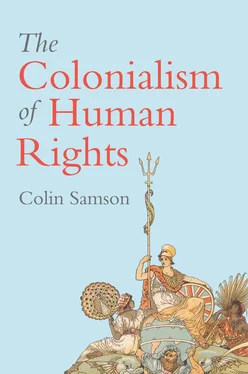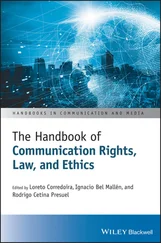Despite this flattering assessment, both the French and American Revolutions granted rights of franchise and property only to white males. Unequal rights were further necessary because colonial states were concerned with control of land, and, to justify this, a discourse representing the peoples who inhabited these lands as unqualified to hold on to it was invoked. Colonial subjects, therefore, were treated under exceptional measures. Denial of the rights celebrated in the Enlightenment was often justified under colonialism as part of the necessary tutelage of backward peoples. As Alice Conklin argues, regarding the early French Third Republic and its colonial occupation of West Africa, the mission civilisatrice , while attempting to destroy local customs and ‘feudal’ economies at variance with liberal Republicanism and to instil liberal values and market capitalism, crushed rights that would have been extended to Europeans. 18The French may have built railways, schools, roads and hospitals, but ‘with disastrous consequences for Africans: forced integration into the world market on unfavorable economic terms, suspension of political rights, corvée labor, as well as the denial of full legal protection’. 19
As Benton and Slater observe, ‘the world that launched notions of civic rights, was a world not of nations but of empires’. 20As empires, European states necessarily introduced laws, codes and institutions that embedded differential rights between the categories of people configured under their dominion, and these were often supported by powerful currents of political thought. Furthermore, the sensibilities, convictions and racial dominance, as well as the institutional dynamics, that sustained colonialism and slavery have not expired along with formal empires and trans-Atlantic slavery.
Non-universal Human Rights
While contemporary liberalism often associates human rights with the legacies of classical thinkers, law is frequently invoked as the key to current understandings of human rights. There exists a pervasive legalism that sees human rights as apolitical and ahistorical sets of events in which lawyers call witnesses, ascertain intent, and measure evidence of violation against the growing body of national and international laws. This is not to say that national and international laws are irrelevant, but undue emphasis on them and the legal scholarship surrounding them obscure how the definition and interpretation of human rights are enmeshed in broader social, spatial and temporal processes. Instead of being seen purely as an instrument to assess human rights, law, especially that pertaining to rights, was also an enabler of colonialism and maintains this role in administering the ongoing consequences of it. As mentioned earlier, colonial judiciaries may have in some places and in some respects borrowed from indigenous traditions, but they ultimately served the cause of colonial domination over lands and peoples.
States, no matter how they acquired their powers, are unique in having what is depicted as legitimate authority to interpret and administer rights of populations. They are protected through the construct of political sovereignty, which enables states to ignore, contradict or violate law. This is significant for European powers, which are largely immune from formally being charged with legally defined human rights abuses related to colonialism and enslavement since the crimes took place before the instruments, and courts such as the ICJ, the International Criminal Court (ICC) and regional bodies like the Inter American Court of Human Rights or the European Court of Human Rights (ECHR), were established. Although there is in law a concept of continuing violation, courts in Europe have been reluctant to hear such cases because they ‘have usually a political aspect with which tribunals are, in principle, hesitant to deal and, secondly, because of the fear that the examination of such cases will increase considerably the workload of the organs with competence to deal with complaints for violations of human rights’. 21That the principle of continuing violation does not extend to colonial situations was recently affirmed by the ECHR in a case brought by descendants of the twenty-four Chinese rubber-plantation workers executed by British soldiers in 1948 at Batang Kali, Malaysia. The judges reasoned that the killings that the troops were accused of carrying out in the colony occurred before the Court was established. 22Other means to hold Britain accountable through a Public Inquiry were rejected by the Cameron government in 2015. As this case illustrates, in its caution regarding retroactive application to the colonial past, the law permits, even embraces, selectivity in what violations are justiciable. German atrocities in Europe before and during World War II, for example, were not exempt from retroactive law.
It is no doubt true, as Max Weber argued, that impartial and rational law is simply the latest phase in the history of authority. 23To be legitimate, it must follow prescribed rules and procedures, and, by doing so, law supplies legitimacy to states, in part through the imagined social contract. But this appearance of legitimacy presupposes both that the law covers all eventualities that states administer, and that politicians, especially executives, work for the public good rather than for a partisan or other cause. It further assumes that the law itself, which states create, interpret and enforce, is impartial. In his classic statement on this, ‘Politics as a Vocation’, Weber admits that, among the ranks of politicians, lawyers loom large. 24This means that those who are charged with formulating and interpreting the law also wield powers to manipulate the law in myriad ways. In considering Batang Kali, the lawyers at the ECHR and politicians of the British state each affirmed the selective inapplicability of human rights.
Hence, even Weber’s legal rational authority can never be a purely bureaucratic exercise. Drawing on the works of Giorgio Agamben, 25we could say that it is not an impersonal bureaucracy that formulates and dispenses law and applies it rationally to all individuals, groups and institutions. Rather, although there are some sporadic checks such as judicial reviews in most countries, state sovereignty enables executives to override the checks, making any attempts to separate the legal from illegal a Sisyphean task. While qualifications, differentiations and conditionality can be applied to human rights laws, following the philosopher Carl Schmitt, Agamben argues that a ‘state of exception’ is vested in sovereignty itself. Indeed, pronouncing exceptions to the general rule is what defines sovereignty. The state is sovereign over citizens and free to make laws to control, categorize, register and document people, as well as to make differentiations within the citizenry and between it and non-citizens. The state can also make new laws or take executive actions to supersede protections of civil liberties and to violate its own laws. In democracies, state officials need not always follow the tortuous legislative processes to implement such differentiations, and can circumvent or ignore the multitudes of laws, conventions and protocols to impose decisive action. The state of exception is increasingly common and has become the ‘dominant paradigm of government’. 26Therefore, if the formal and informal group differentiations of rights are not enough to sustain legally a hegemonic social and economic order, a state of exception is the default position.
However, a state of exception is often unnecessary, because of the existence of social differentiations that rule out exercises of human rights that might be inconvenient to state politicians in one regard or another. Contemporary differentiations in the position of people regarding their human rights in colonial situations are paralleled internally by massive social and economic inequalities in Western countries that have serious implications for the exercise of rights. These were publicized by nineteenth-century reformers in Britain and the USA such as Seebohm Rountree, Charles Booth and Henry Mayhew, as well as their twentieth-century counterparts Jacob Riis, Jack London and George Orwell. These writers vividly described the misery that befell working people as urban industrial capitalism established itself. The wealthiest cities were populated by masses of paupers, homeless people, beggars, and sick and infirm people living on streets or in overcrowded hovels. The exacerbation of inequality coincided with the advent of capitalism, which Karl Marx and Friedrich Engels, jointly and separately, would use as evidence for their commentaries on capitalist society. One dimension of this was the realignment of rights away from those obtained via feudalism – in which mutual obligations between landowners and peasants cemented a stable but exploitative social order – to capitalism, where owners of capital (employers) replaced the paternal bonds with the ‘callous cash nexus’, the uncertainties of economic cycles, and mechanisms to minimize wages and maximize production.
Читать дальше












